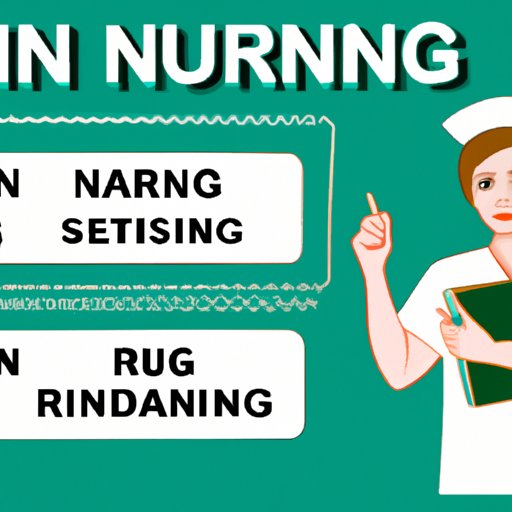I. Introduction
Becoming an RN is an exciting career choice that offers many opportunities for personal and professional growth. Nurses are integral to healthcare and play a vital role in enhancing patient outcomes. In this article, we will provide aspiring RNs with a step-by-step guide to becoming an RN, educational requirements, exam preparation tips, professional development opportunities, and practical advice from experienced RNs on how to build a successful career in nursing.
II. Step-by-Step Guide to Becoming an RN
The path to becoming an RN typically involves completing high school prerequisites and requirements, choosing the right college program, completing required coursework and clinicals, preparing for the NCLEX exam, and finding and applying for your first job as an RN.
A. High school prerequisites and requirements
Most nursing programs require high school prerequisites such as biology, chemistry, and anatomy, among others. It’s essential to research the specific requirements for the nursing programs you are interested in and ensure that you meet them.
B. Choosing the right college program
When selecting a nursing program, consider factors such as program length, delivery method, tuition costs, location, and available specializations. It’s also important to ensure the program is accredited by a recognized body.
C. Required coursework and clinicals
Once admitted into a nursing program, students will complete coursework in nursing theory and clinicals, where they gain valuable hands-on experience working with patients. It’s essential to maintain a strong academic record, as well as to seek out additional learning opportunities, such as volunteering and internships.
D. Preparing for the NCLEX exam
The NCLEX exam is a standardized test used to determine an RN’s competency and eligibility for licensure. Students should start preparing for the exam early, such as taking review courses and utilizing study guides and flashcards. Be familiar with the test-taking format and common types of questions asked.
E. Finding and applying for your first job as an RN
Upon graduating and passing the NCLEX exam, RNs can explore various job opportunities. It’s advisable to network, seek out mentorship, and consider the career paths that interest you most, such as hospital, community, or school-based nursing.
III. Educational Requirements for Becoming an RN
The educational requirements for becoming an RN vary, depending on the nursing program and degree type. However, most programs require specific prerequisites and offer varied degrees such as an ADN, BSN, and MSN.
A. Prerequisites for nursing programs
Prerequisites for nursing programs typically include high school-level coursework in science, math, and English. Students may also need to take standardized tests such as the ACT or SAT, as well as complete additional clinical hours or observations to gain admission to their desired program.
B. Types of degree programs available
The nursing profession offers various degree paths, including associate degree (ADN), bachelor’s degree (BSN), and master’s degree (MSN). Students pursuing an ADN usually complete the program in two years, while BSN and MSN programs can take up to four to six years, respectively.
C. Accreditation and certification bodies
It’s essential to select an accredited nursing program that has met the standards set forth by the Commission on Collegiate Nursing Education (CCNE) or the Accreditation Commission for Education in Nursing (ACEN). Certification bodies like the American Nurses Credentialing Center (ANCC) offer specialty certifications such as critical care, pediatrics, and gerontology, among others.
D. Online learning options for aspiring RNs
Online learning can be an excellent option for aspiring RNs seeking flexibility and convenience. Many nursing programs offer online delivery options, allowing students to complete coursework and clinicals at their pace. It’s essential to ensure that the program’s online delivery is accredited and recognized by certification bodies.

IV. Exam Preparation Tips for the NCLEX Exam
The NCLEX exam is a challenging test that demands adequate preparation. These Are some tips to help prospective RNs prepare:
A. Resources for preparing for the NCLEX
Various study guides, online resources, and review courses can provide essential preparation materials for the NCLEX exam. Ensure that the resources you choose reflect the latest testing standards and tools.
B. Common test-taking strategies
Stress management is essential during the exam. The NCLEX exam has a timer, so time management is key. There are different types of questions, including multiple-choice, fill-in-the-blank, and drag-and-drop, among others. Practice different test-taking strategies and identify ones that work best for you.
C. Tips from successful RNs on how to anchor for the exam
Experienced RNs suggest relieving any anxiety and finding locations that exude calm. Ensure you get adequate sleep, stay hydrated, eat healthy, take breaks, and breathe deeply. It’s also important to remain positive and confident throughout the entire exam process.
V. Professional Development Opportunities for RNs
Professional development opportunities present themselves in many ways and at various career stages. These opportunities can include specialized areas of practice, advanced degrees and certifications, paths to career advancement, and continuing education requirements for RNs.
A. Specialized areas of practice for RNs
Nursing offers various areas of specialization, such as critical care, oncology, pediatrics, and adult care, among others. Specialization can afford in-depth training and skill-building, as well as offer an RN’s career tremendous growth opportunities.
B. Advanced degrees and certifications
Advanced degrees such as a BSN or MSN can open doors to career growth and advancement. Certifications such as specialty certifications (critical care, pediatrics, and gerontology, among others) and credentialing for nurse leaders (nurse manager administrative certification) can signify advanced skills and leadership capabilities.
C. Paths to career advancement
RNs can advance their careers by taking on additional roles such as nurse educators and clinic or hospital managers. They can also broaden their skills and experience by traveling as a travel nurse, writing research articles, and volunteer work.
D. Continuing education requirements for RNs
Nursing is a constantly evolving field, with new technologies and standards demanding continuous learning. RNs must stay up-to-date with their professional development requirements and invest in ongoing education to maintain their licenses.
VI. Practical Advice from Experienced RNs
Experienced RNs have been there, done that. They offer practical advice on forging successful careers, navigating the workplace, and managing stress and self-care.
A. Tips for building a successful career as an RN
Navigating the nursing profession can be difficult. Still, experienced RNs suggest seeking mentorship, networking, building strong relationships with colleagues and peers, and continuing to learn by reading nursing literature, attending conferences and workshops, and seeking out opportunities that promote growth.
B. Navigating the workplace and coping with stress
RNs’ daily routines can be stressful. It’s essential to take care of themselves, such as taking breaks away from the hospital environment, having a good work-life balance, and cultivating a support system. Massage, counseling, and engaging in physical activities such as jogging, swimming, and yoga can help manage stress.
C. The importance of self-care for RNs
Self-care is essential for RNs to avoid burnout. Drinking plenty of water, getting enough sleep, eating healthy, and taking breaks are essential. Managing personal finances and setting achievable goals can help combat the added stressors present at home and work.
VII. Raising Awareness About the Nursing Profession
Nursing continues to be a vital profession, yet still suffers from a lack of recruitment. It’s essential to create awareness of the role and impact of RNs on patient care. Highlighting the various nursing specialties, such as critical care, pediatrics, and adult care, among others, can help students choose the right path and increase their appreciation for nursing.
A. Highlighting the role and impact of RNs on patient care
RNs play a critical role in patient care. Their role demands advanced critical thinking, strong interpersonal skills, and the ability to work in a fast-paced environment. Highlighting the impact of RNs on patient safety, care coordination, disease prevention, and diagnosis is an essential way to inform the public about nurses’ value.
B. Discussing the various nursing specialties
Specialization is a way to pursue individual interests and gain advanced skills. Educating students about critical care, geriatric care, oncology, and pediatrics, among other nursing specialties, can broaden their career prospects and create a heightened awareness of the nursing field’s versatility.
C. Building appreciation for nurses and the nursing profession
Raising awareness of nursing, its history and evolution, and the many challenges and rewards of the profession creates appreciation and admiration. Nurses deserve respect, job satisfaction, and recognition for their work. By highlighting the nursing profession’s value, coming generations will be attracted to nursing as a career.
VIII. Insights from RNs on the Nursing Profession
Experienced RNs share their unique perspectives on various aspects of the nursing profession, creating a cohesive and reflective section.
A. Interviewing experienced RNs for their unique perspectives
Interviewing experienced RNs on their unique experiences and challenges can provide insight and inspiration for aspiring RNs. RNs can share stories about successful patient outcomes, challenges they faced and overcame, and the rewards of a career in nursing.
B. Integrating RN perspectives throughout the article
Integrating RN perspectives throughout the article can provide an example of success, perseverance, and growth in the nursing profession. Experienced RNs can share tips and tools that worked for them, talk about the importance of networking and mentorship, and share their thoughts on the nursing shortage and ways to address it.
C. Offer a cohesive concluding section based on insights gained
Offering a cohesive concluding section after incorporating experienced RN insights throughout the article can reflect on the nursing profession, its challenges, and its future prospects. A call to action to encourage aspiring RNs to pursue their dreams, take action, and contribute to the future of nursing can inspire readers to take action.
IX. Conclusion
Becoming an RN is a challenging and rewarding career choice that, with perseverance and adequate preparation, can lead to individual growth, career advancement, and amazing opportunities to impact others. Readers can explore the resources and next steps available to them, such as continuing to research nursing programs, preparing for the NCLEX exam, and looking for mentorship opportunities. Emphasize the importance of pursuing their dreams and making a positive impact on the world as an RN.
